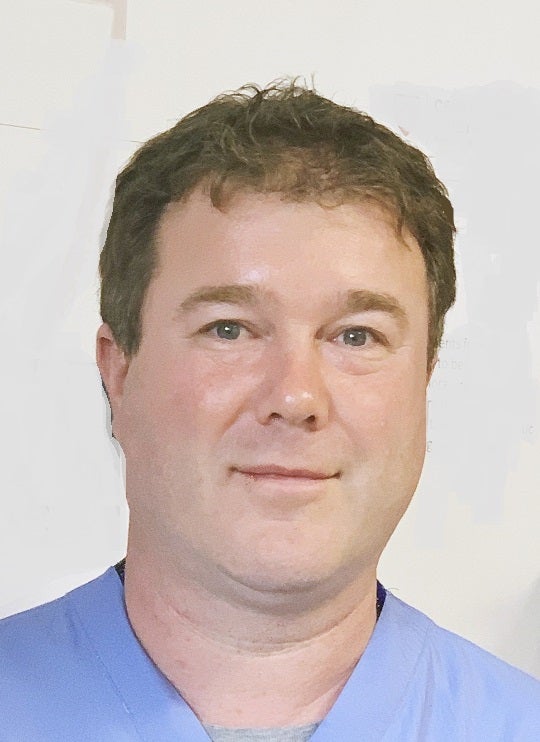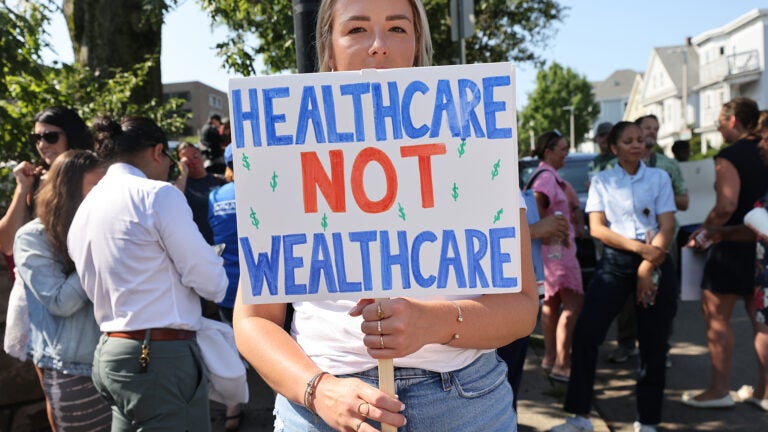Readers Say
“We are a huge safety net for the community, and they’re going to be at a loss,” Stephen P. Wood, a nurse practitioner at Carney Hospital, told Boston.com.
This story was told by Stephen P. Wood, a nurse practitioner at Carney Hospital, a Steward Health Care hospital in Dorchester set to close by August 31. Wood’s story has been edited from a conversation with Annie Jonas.
I’m a constituent of Dorchester. I’m a nurse practitioner and I work at Carney Hospital. I’m also a bioethicist. I trained at Harvard Medical School and Harvard Law School as a bioethicist, and I’m currently a professor at Northeastern University in the School of Nursing and the Division of Medical Sciences.
This issue hits me from a number of different directions.

One, as a constituent of Dorchester in the Adams Village-Lower Mills area, this is the only lifeline for many people for access to health care — in Dorchester, in Mattapan, and even parts of Roxbury. We serve a very vulnerable and marginalized population. We’re a real safety net for a variety of issues, including a multitude of the Haitian immigrants that are coming in. We’re their first point of contact for access to health care.
And it hits me from the bioethicist perspective. I kept hearing at the press conference from U.S. Congressman Stephen Lynch and from others that they didn’t see this coming, that they’re going to at least try to make [Steward Health CEO] Ralph de la Torre held responsible, and they’re going to hold Stewart responsible. There’s a couple of issues with that. One, this was a long time coming, and people saw this coming down the pike for years — from day one.
The other piece of this is, all of these politicians speak about equity, they speak about equitable access and ethical access. That’s what this is all about. Mass General and Brigham are in the Fenway and in Beacon Hill, and all of the hospitals they purchased are in Newton, in Wellesley and Concord and Martha’s Vineyard. Beth Israel Lahey is the same thing, they’re in Burlington, they bought Beverly hospital, they bought Winchester hospital. All of these hospitals have been allowed to invest in some of the richest communities in our state, while those of us in Dorchester, Roxbury, Mattapan, are being left behind. From an ethical perspective, that’s really concerning.
I think that we need to prioritize our healthcare system, and people have allowed it to run completely amok with no thought whatsoever on equitable access to health care. For Boston, if you’re rich, you’re going to have a hospital next to you, you’re going to have all the resources you need. And if you’re poor, you simply aren’t. And that’s the message that was sent [at the press conference on July 29].
Thankfully, this is a job that I only work at part-time. But it’s still a source of income. I love working here because I love working with the people here. It’s a community hospital, we’re a family. I know everyone’s name, from the housekeepers to the transport to the radiology techs to the nurses. I’ll miss working and providing care for my community, which is another reason that I work here. I’ll thankfully be able to land on my feet, and I think a lot of doctors and nurses will as well.
But Carney Hospital is the second largest employer in Dorchester [according to a 2016 report by the Boston Planning & Development Agency, formerly the Boston Redevelopment Authority]. A lot of Carney employees are not physicians and nurses, they’re emergency room techs, they’re people that do transport, they are people in the kitchen, people that do parking – those jobs are not going to be easy to come by.
We have an Emergency Medical Station and a paramedic truck stationed at Carney, and that’s going to have to move. So now access to EMS is going to be much longer, and then transport to any appropriate hospital is going to be much longer.
We are the ER, oftentimes the primary care provider, the social services, the clothier, we give people food. We are a huge safety net for the community, and they’re going to be at a loss. We were getting calls from people saying, “What do I do? Where am I supposed to go?”
We had a dialysis unit here. Where are those people going to go? We have 40 mental health beds that will soon be gone, and that includes pediatric care. Those beds are going to be gone and there’s nowhere for them to go. That’s going to have a huge impact.
My worry is that the politicians aren’t that worried, because they say we can convert this hospital into either something that’s going to make the city money, like multi-use, or transitional housing. And that’s all fine and good, except you still need healthcare.
All the patients that we see and all the patients that we admit, there’s no capacity for this city to manage that already. We had patients who were transported to adjacent hospitals, and they’re just becoming overwhelmed.
Stephen P. Wood is a nurse practitioner at Carney Hospital in Dorchester.
Boston.com Today
Sign up to receive the latest headlines in your inbox each morning.
